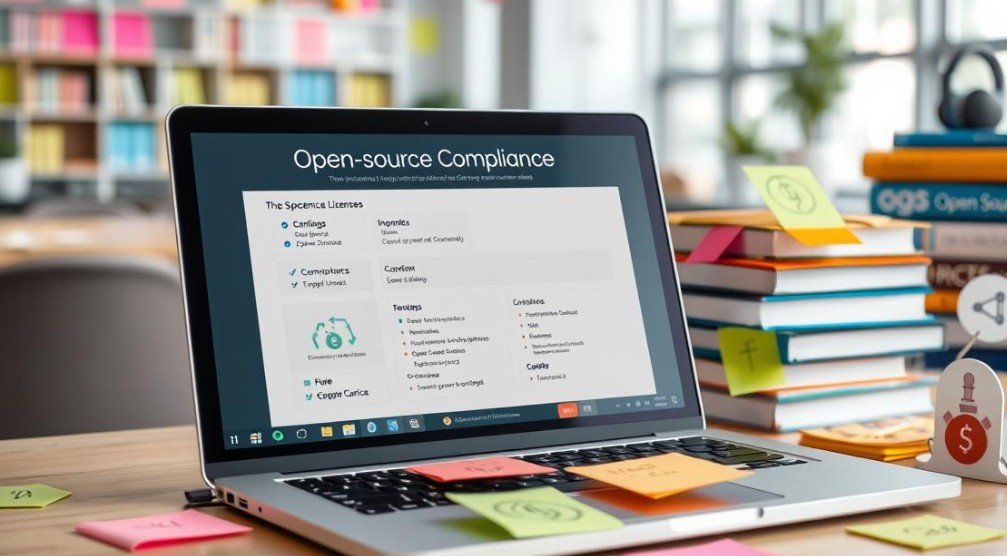In the world of software making, open-source licensing is very important. This is especially true in India. Developers need to know about open-source licensing to follow the law and protect their work.
This article will help developers understand open-source licensing in India. It will give them the knowledge they need to succeed in this changing world.
Key Takeaways
- Explore the legal framework and copyright laws governing open-source software in India
- Understand the rights and obligations under popular open-source licenses used in the Indian software industry
- Discover best practices for ensuring compliance with open-source licensing requirements
- Recognize the importance of maintaining a proactive approach to open-source licensing management
- Stay informed about the latest developments and trends in the open-source licensing landscape in India
Understanding Open-Source Licensing Fundamentals in India
Software development in India is growing fast. Knowing about open-source licenses is key for developers and businesses. Licenses like GPL, Apache License, and MIT License are important for the Indian software world.
Popular Open-Source Licenses Used in Indian Software Industry
In India, GPL, Apache License, and MIT License are big. Each has its own rules. These rules affect how users and creators work together.
- The GPL makes sure software stays open by requiring changes to also be open.
- The Apache License lets you use, change, and share software for money. It keeps the original software’s name safe.
- The MIT License is very flexible. It lets you use, change, and share software for money with few rules.
Legal Framework and Copyright Laws in India
The Indian Copyright Act of 1957 is key for software rights. It says software is a special kind of work. This gives creators certain rights, like making copies and changes.
But, India’s view on software patents is still being talked about. There are many legal and policy issues at play.
Rights and Obligations Under Open-Source Licenses
Open-source licenses give developers freedom. They can use, change, and share software. But, they must follow the license’s rules. Not following these rules can lead to legal trouble.
| License | Rights | Obligations |
|---|---|---|
| GPL | Use, modify, and distribute the software | Distribute derivative works under the same or compatible license |
| Apache License | Use, modify, and distribute the software, including for commercial purposes | Provide attribution and include the license text |
| MIT License | Use, modify, and distribute the software, including for commercial purposes | Include the original copyright notice and license text |
Knowing about open-source licenses in India helps developers. It helps them follow the law and meet licensing needs.
Open-Source Licensing Compliance and Best Practices
In India, the open-source software world is growing fast. It’s key for developers to know about license compatibility, code attribution, and software auditing. These help follow open-source licensing rules. Not following these can cause license violations and legal trouble.
Keeping license compatibility is very important. Developers need to check the terms of different open-source licenses. This includes the GPL, MIT, or Apache licenses. They must make sure any used components or libraries fit their project’s license.
It’s also crucial to give proper code attribution. Developers should clearly show where third-party code or libraries come from. This includes the license info and copyright notices. It shows respect for the open-source world and helps avoid license violations.
Doing regular software auditing is another key step. By checking their code and dependencies often, developers can spot any license violations or issues early. This lets them fix problems before they get worse.
There are many compliance tools for Indian developers. These tools help check code, find license problems, and give detailed reports. They make it easier to keep up with licensing rules.
Conclusion
Open-source licensing in India is very important. It helps with software innovation and working together in the open-source world. By knowing how these licenses work, developers and companies can avoid legal problems. This lets them use open-source technology to its fullest.
This article talked about the main licenses used in India’s software world. It also covered the laws that affect open-source projects. Knowing these things helps developers and businesses work well together.
The open-source movement is growing fast in India. It’s key for developers, entrepreneurs, and leaders to stay up-to-date on licensing and working together. By following open-source rules and understanding legal stuff, India’s tech scene can grow a lot. It will see more innovation, teamwork, and growth.
The Role of Non-Disclosure Agreements (NDAs)
FAQ
What are the popular open-source licenses used in the Indian software industry?
In India, the GNU General Public License (GPL), Apache License, and MIT License are popular. Each license has its own rules. It’s key for developers to know these rules when picking a license for their projects.
What is the legal framework for open-source licensing in India?
The Indian Copyright Act is the main law for open-source licensing here. It talks about rights and rules for software creators. It covers fair use, code credits, and license matching.
What are the rights and obligations under open-source licenses in India?
Licenses like the GPL give certain rights and duties to developers. They might need to share source code, give credits, and follow rules about sharing changes.
How can developers ensure compliance with open-source licensing in India?
To follow open-source rules, developers should do audits, give proper credits, and use tools for license management. They also need to watch for license issues to stay safe legally.
What is the role of the open-source community in software innovation in India?
The open-source community in India is crucial for innovation and teamwork. By sharing code and knowledge, they help create new software. This is done while following legal and ethical rules.

